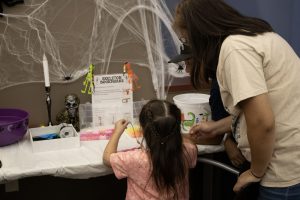By Samantha Smith
With Halloween a week away, the prospect of having a good time can sometimes supersede the need to be safe.
Dr. Fausto Meza, Vice President of Medical Affairs at Seton Hays Hospital, which is part of Ascension medical group, said following several safety tips can keep revelers safe on All Hallows Eve.
Meza’s advice extended to warnings from the Centers for Disease Control (CDC) against cumbersome costume accessories, avoiding going trick-or-treating alone, as well as eating unexamined treats and entering strangers’ homes.
But there are some dangers parents and children may not be aware of.
Meza said that many children, parents and young adults make the mistake of slathering on costume make-up only to discover that they are allergic to the ingredients.
Meza recommended that people who want to add make-up to their costume should test the make-up’s reaction on their skin by first testing it on a small area to watch for an allergic reaction.
Another warning Meza had for everyone going out on Halloween night was road safety.
“At this time of year, child deaths due to vehicle accidents go up,” Meza said.
Meza supported Centers for Disease Control (CDC) suggestions that parents should not let their children Trick-or-Treat alone and that they should attach reflective tape to their costumes for better visibility for drivers at night.
While young children and families are cautioned to watch for traffic, drivers also should be more cautious behind the wheel and be mindful of trick-or-treaters, Meza said.
Trick-or-treating in groups and in familiar places, along with carrying flashlights to aid in visibility, were tips Meza suggested.
For adults, one of the primary dangers associated with Halloween is drinking and drinking while driving.
Meza recommended those who choose to drink during Halloween do so responsibly.
“Don’t drink and drive,” Meza said.
Eye injuries are also prevalent during the Halloween season.
Meza warned against mail order contact lenses that aren’t regulated by the FDA.
He said such lenses are not prescription and are not fitted correctly to an individual’s eye, which could result in scratching of the cornea.
Meza said this condition could cause corneal abrasions, which can be very painful and lead to an infection.
“Have a professional help you like an Ophthalmologist, who can fit them to your eyes and teach you about proper hand cleaning,” Meza said in relation to contact lenses.







